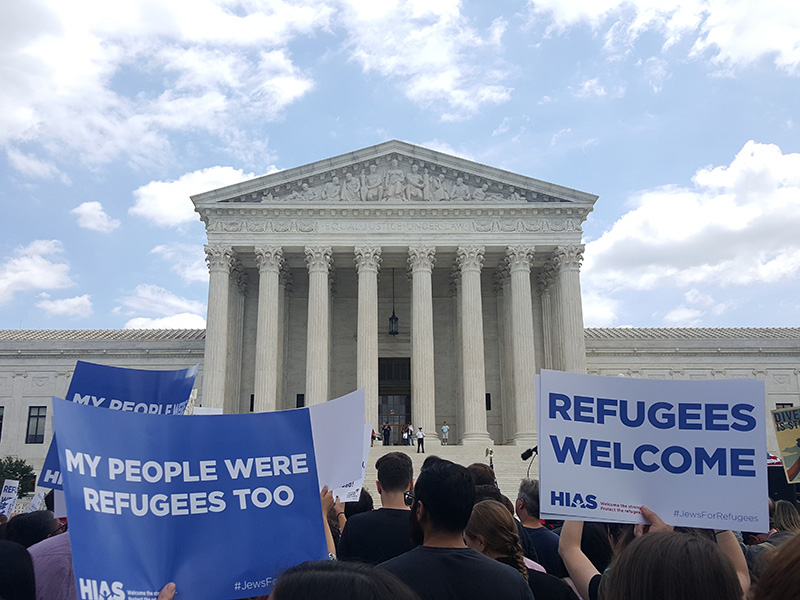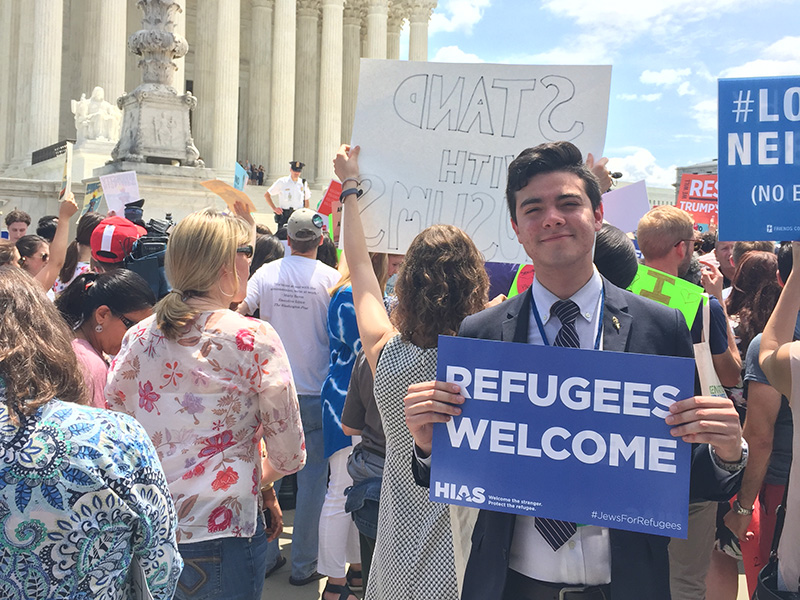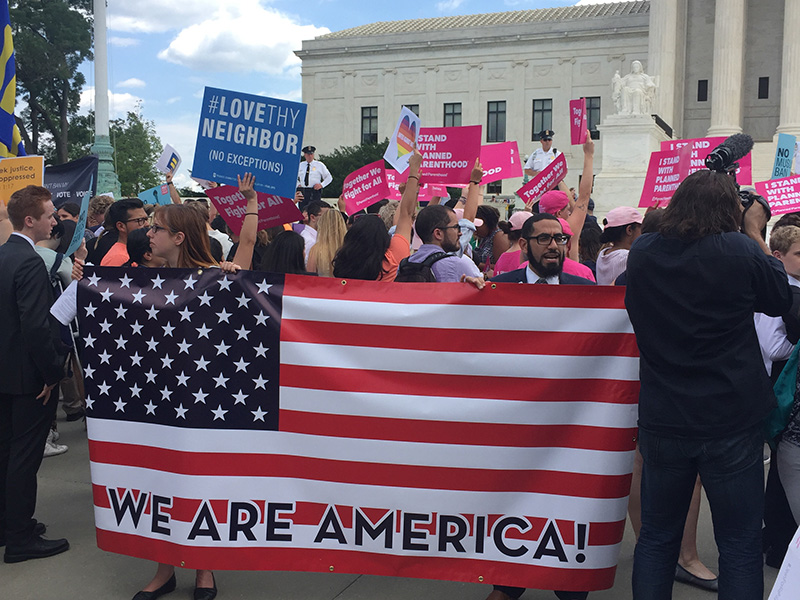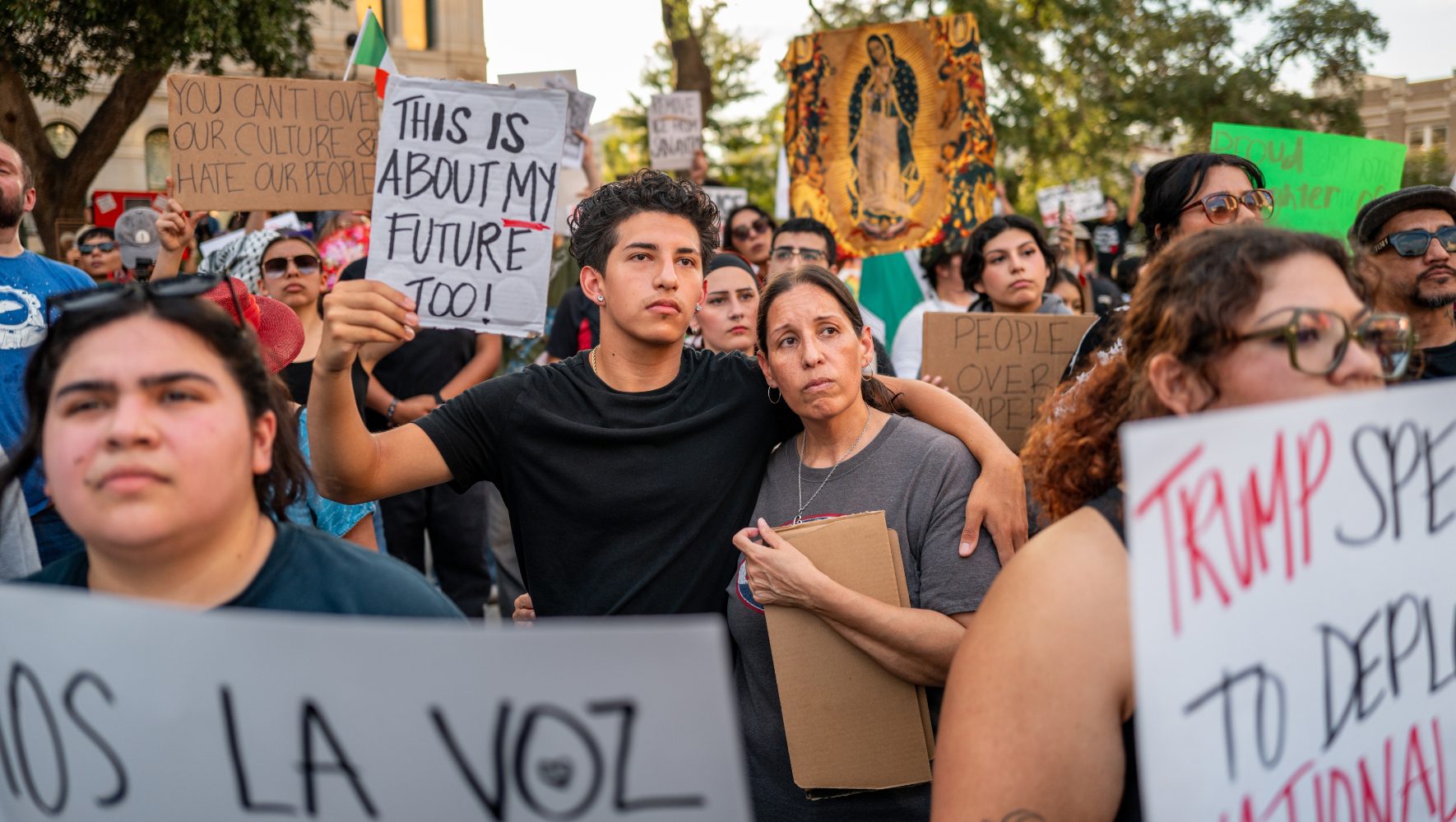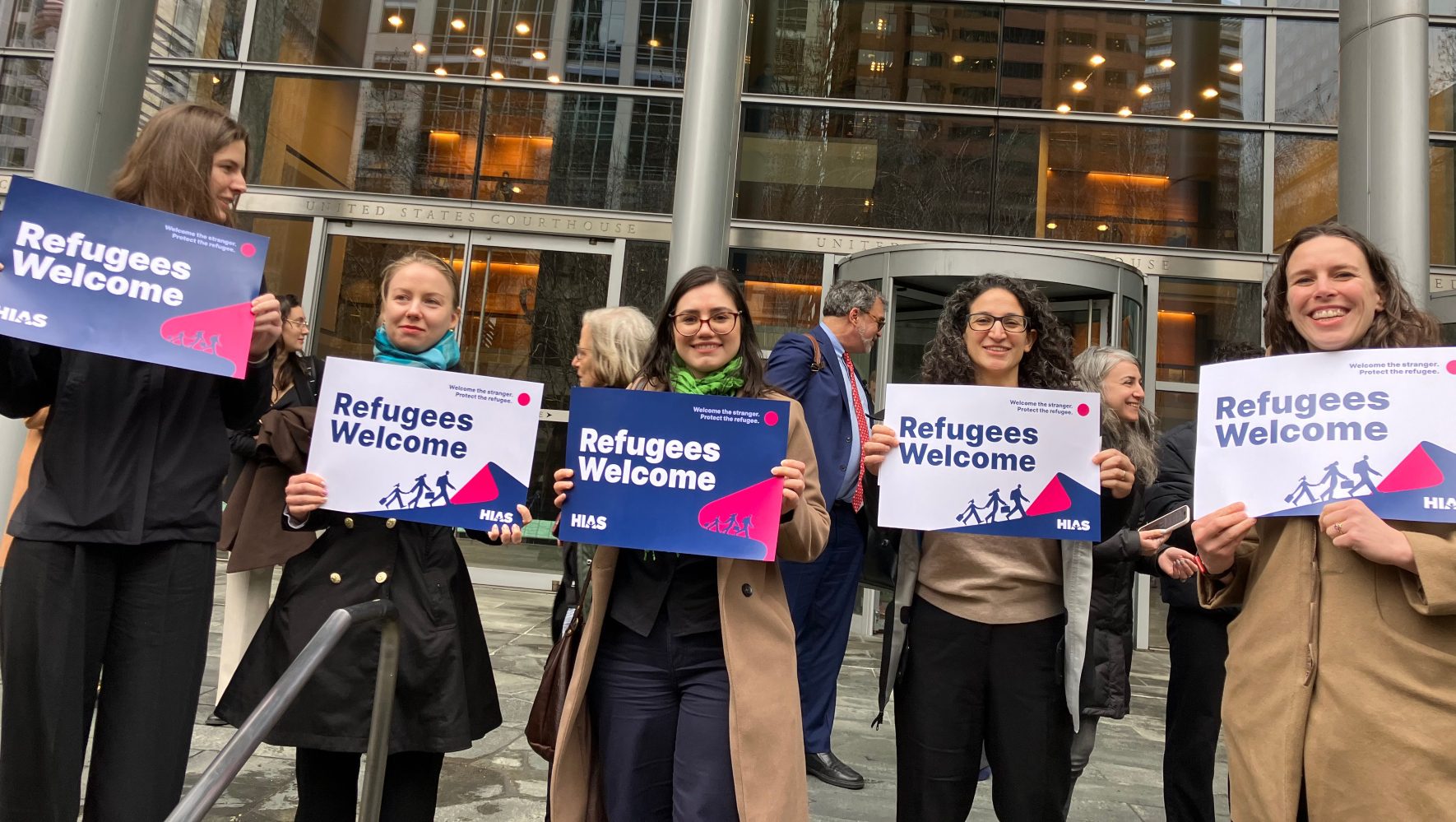Activists Protest Supreme Court Muslim Ban Decision
By Joshua Kurtz, Community Organizer, AVODAH Corps Member
Jun 27, 2018
On Tuesday, June 26, activists across the country protested the U.S. Supreme Court’s decision in Trump v. Hawaii to uphold the most recent iteration of the Trump Administration’s travel ban.
In a 5-4 ruling, the Supreme Court sided with President Trump on an executive order restricting entry into the United States for nationals of seven countries, including five Muslim-majority ones.
Although this version of President Trump’s travel ban does not impact refugee admissions into the country, it mirrors the administration’s ongoing assault against the United States’ refugee and asylum programs, and animus toward immigrants.
“The Muslim ban is not simply an exercise in executive authority, it’s the Trump Administration’s official license to discriminate on the basis of religion and nationality,” Mark Hetfield, HIAS’ President and CEO, said in a statement.
During his campaign, Donald Trump called for a “total and complete shutdown of Muslims entering the United States.” And on January 27, 2017, as one of his first executive actions, Donald Trump banned travelers from predominantly Muslim countries and all refugees from entering the United States.
After the first two versions of the ban were defeated in court, the administration separated out the travel ban into a separate proclamations, and issued a new, third version in the fall of 2017.
Writing for the majority on the legality of this latest version of the travel ban, Chief Justice John Roberts stated that President Trump’s executive order is “squarely within the scope of Presidential authority under the Immigration and Nationality Act.”
But outside the Supreme Court, in the court of public opinion, hundreds of activists joined the Council on American-Islamic Relations (CAIR), the ACLU, and dozens of other organizations to publicly display their outrage following the ruling.
In cities across the country, faith leaders, activists, and lawmakers gathered together to protest the court’s ruling and stand in solidarity with the Muslim community.
If this isn't the country we want to live in, we've got to say it as loudly as possible. #NoMuslimBanEVER pic.twitter.com/7mdGmXlBZO
— ACLU (@ACLU) June 26, 2018
In New York City, thousands of activists chanted “No ban, no wall, no raids, NY is for all” during a protest in Foley Square. And in Minnesota, U.S. Representative Keith Ellison, the first Muslim elected to congress, spoke to protestors outside the federal courthouse in downtown Minneapolis.
“Your physical presence here,” Ellison said, “is a witness that you believe that solidarity is resistance.”
In her dissenting opinion, Justice Sonia Sotomayor argues that the majority came to its decision by “ignoring the facts, misconstruing our legal precedent, and turning a blind eye to the pain and suffering the Proclamation inflicts upon countless families and individuals.”
“The United States of America,” she notes, “is a Nation built upon the promise of religious liberty. Our Founders honored that core promise by embedding the principle of religious neutrality in the First Amendment. The Court’s decision today fails to safeguard that fundamental principle.”
“Whatever the court may have intended,” Cody Wofsy, a staff attorney with the ACLU, wrote in a blog, “the message it relays to Muslim communities around the country and around the world is that our Constitution tolerates transparent discrimination and animus against Islam.”
As a result of this week’s decision, millions of people will be barred from entering the United States unless they are granted an individual waiver. However, as Sirine Shebaya and Johnathan Smith, attorneys with Muslim Advocates, recently argued in the Washington Post, the Trump Administration has not been keen on granting waivers to individuals who need them the most.According to the third iteration of President Trump’s travel ban, exceptions are supposed to be considered for individuals who meet one of many qualifications.
Moreover, although the Justice Department has cited the waiver program in its defense of the executive order, the administration has failed to provide information on how it processes waiver requests.
“The waiver process,” Shebaya and Smith point out, “has proved to be ‘window dressing’ and a sham, illustrating once more that this ban is just what it was intended to be when Trump first proposed it 2.5 years ago: a ‘total and complete shutdown,’ in every sense of the word, of Muslims coming to the United States.”
Of the 800 individuals that the government claims have been “cleared” for a waiver, Shebaya and Smith report, there is no indication of whether anyone has been able to enter the United States.
The government’s refusal to follow through on its promise to grant individual waivers reflects the administration’s broader efforts to substantially limit the number of immigrants and refugees entering the United States.
The number of Muslim refugees admitted to the United States so far this year is down 89% from the prior federal fiscal year—from 21,565 refugees in 2017 to 2,452 so far in 2018. Although admissions of refugees from all faiths have dropped significantly, the relative proportion of Muslim refugees has dropped even more. At this point in fiscal years 2016 and 2017, Muslim refugees comprised 45% and 44% of total refugee admissions, respectively. As of June 26 during the current fiscal year, however, Muslim refugees represent just 15% of total admissions.
Over the past several months, the Trump Administration has also introduced and implemented policies that target individuals seeking asylum in the United States. On June 20, World Refugee Day, President Trump signed an executive order that would replace the policy of separating families with the policy of detaining families indefinitely. And this week, he called for undocumented immigrants to be deprived of due process rights.
Since President Trump came into office, the American Jewish community has mobilized in support of refugees, asylum seekers and immigrants.
In the streets, in places of worship, in the courts, and on Capitol Hill, HIAS and our partners have fought to uphold America’s legacy of welcome.
Around the country, HIAS and its resettlement partners are continuing to support individuals seeking safety in the United States. HIAS Pennsylvania, for example, has been working recently to providing legal aid to families separated at the border.
Nearly 350 national, state, and local organizations signed on to a letter opposing the administration’s family separation policy, and dozens of Jewish leaders have visited the southern border, joined rallies in major cities, and protested outside the ICE headquarters in New York City.
“Together,” Mark Hetfield affirmed, “we will continue fighting to ensure that this period is merely another short, dark chapter in America’s history.”
